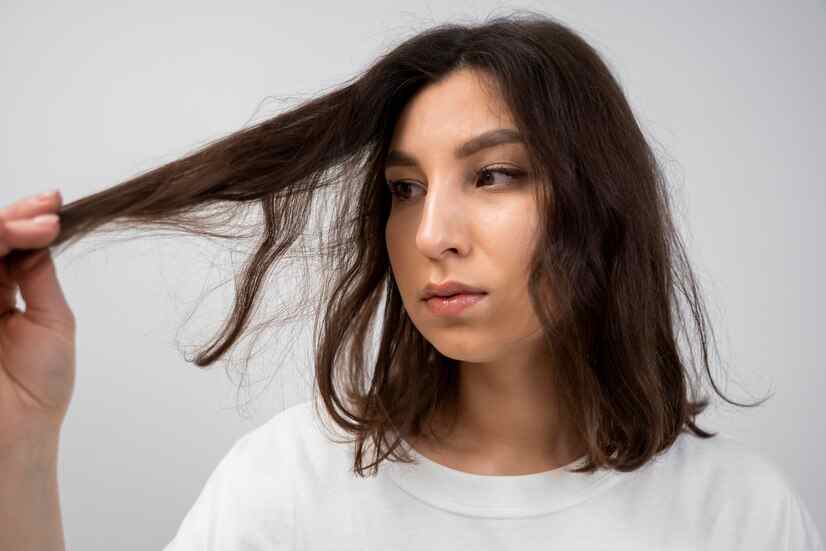Are you dealing with PCOS-related problems like hair loss, dandruff, and an oily scalp? In this article, you can get various tips on how to manage the symptoms of various hair and scalp issues caused by polycystic ovarian syndrome.
PCOS is a common hormonal disorder that mostly occurs in women of childbearing age. It can lead to irregular periods, weight gain, reduced infertility, obesity, and scalp hair loss. Women with polycystic ovarian syndrome develop multiple partially formed follicles on the ovaries that contain an egg. However, these follicles often fail to reach maturity and produce eggs that can be fertilised.
The most common hair problem associated with PCOS in women is hair loss, which is caused by an excess of androgen hormone, which is considered a male hormone. Androgens are male hormones, but they are also present in females in low quantities. The excess production of this hormone can shrink the hair follicles, leading to finer and shorter hair growth and eventually leading to hair loss. Various other factors that can contribute to PCOS-related hair problems are lack of ovulation, inflammation, insulin resistance, nutritional deficiencies, and genetics.

What are the PCOS-related hair and scalp issues?
There are many hair problems and scalp issues caused by polycystic ovarian syndrome, including excessive hair growth (hirsutism), hair loss and thinning, an itchy scalp, and inflammation of the hair follicles. Let’s discuss in detail these hair and scalp issues caused by PCOS.
- Hirsutism
Excessive hair growth, also known as hirsutism, is commonly seen in women with PCOS as it is caused by elevated levels of androgens in the body. A person dealing with excessive hair growth experiences coarse, dark hair in areas where men usually have hair growth, like the face (upper lip, chin, cheeks), chest, back, and abdomen.
- Hair loss and thinning

One of the hair problems associated with PCOS is hair loss. The excessive production of male hormones also has an adverse effect on scalp hair and can lead to gradual hair thinning and eventual hair loss.
- Scalp conditions
Because of the hormonal imbalances associated with PCOS, women experience scalp conditions like dandruff, inflammation, and an oily scalp. If you’re dealing with scalp conditions because of polycystic ovarian syndrome, you may have symptoms such as red, scaly patches on the scalp.
- Hair follicle inflammation
Inflammation of the hair follicles is caused by hormonal imbalances and excess sebum production, which can lead to bacterial or fungal growth in the hair follicles.
Tips to manage symptoms related to PCOS hair and scalp problems
Let’s have a look at some of the tips to manage and reduce the symptoms associated with PCOS hair and scalp problems.
- Balanced diet
It is essential to take an adequate amount of nutrients and minerals that are necessary for the body, hair, and overall health. Therefore, start adding fresh fruits, green leafy vegetables, whole grains, and healthy fats to your diet. Avoid taking processed and packaged foods and refined carbohydrates, as they may influence the hormonal imbalance in the body. To support digestion and improve hormonal balance, start adding turmeric, ginger, and cumin seeds to your diet.
- Herbs

Herbs like Ashwagandha, Shatavari, and Guduchi are rich in hormone-balancing properties; that’s what makes them essential to consume for people dealing with PCOS. These herbs, when consumed in the prescribed amount, can regulate menstrual cycles and reduce the symptoms associated with polycystic ovarian syndrome.
- Scalp massage

Scalp massage with ayurvedic oils such as coconut, Brahmi, or sesame oil can reduce hair fall or loss associated with PCOS. These hair oils are best known for their strengthening and conditioning properties, which, when massaged on the hair, can nourish hair follicles and promote hair growth.
- Panchakarma
Panchakarma is a detoxification therapy that is done by qualified Ayurvedic practitioners to eliminate toxins from the body. This therapy helps restore balance to the doshas of the body and addresses a wide range of health concerns.
CONCLUSION
Women with PCOS also deal with other related problems like hair loss, itchy scalps, inflammation, and others. If you’re also dealing with PCOS-related hair and scalp problems, consulting Ayursparsh Clinic & Panchakarma Center in Dharwad can help provide comprehensive care and specialised treatments.
Seek effective treatment from Dr. Rashmi C. Patil, MD (Ayu), to tackle PCOS-related hair and scalp problems.




